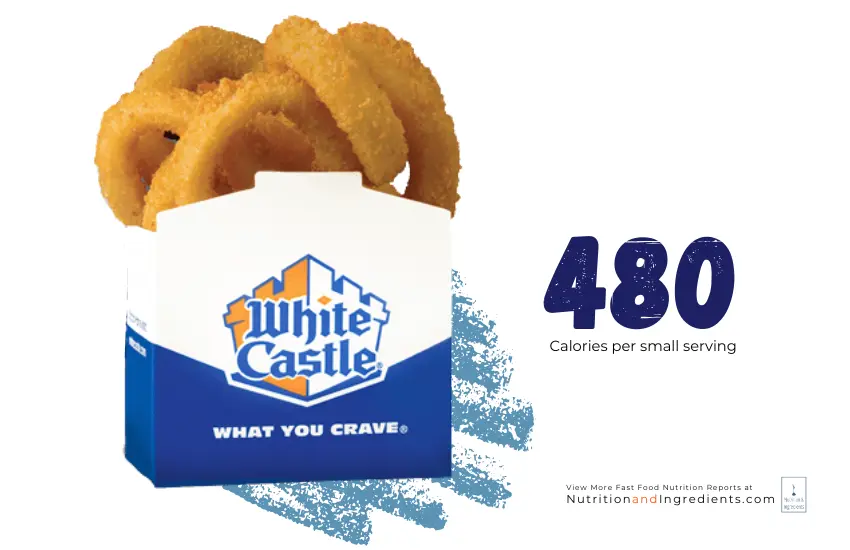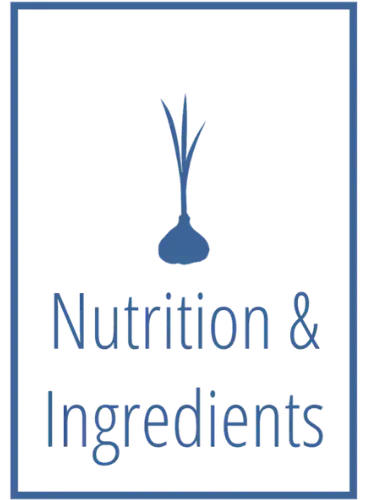White Castle Onion Rings

White Castle onion rings are made with fresh onions and fried to a deep golden brown crisp.
The fast serve restaurant uses corn flour and adds sugar to its recipe, which may enhance the flavors of the onions and other seasoning. Read through to the end of this report for a full list of ingredients.
There are 480 calories, 33 grams dietary fat, 40 grams carbohydrates, and 6 grams protein in a small order of onion rings.
Read this fast food nutrition report for an analysis of calories, and an overview of the nutrition facts and ingredients in White Castle Onion Rings.
Similar menu items such as Onion Chips and Chicken Rings are available at select White Castle locations. Note that calories, ingredients, and amounts of nutrients per serving differ from the classic Onion Rings.
White Castle Onion Rings Nutritional Information
Nutrition facts are based on a measured serving based on order size.
Calories
There are 480 calories in a small order of White Castle Onion Rings.
Here is a summary of calories by macronutrient, per serving:
The majority of calories (61%) are derived from dietary fats. Carbohydrates make up approximately 33% of the total calories and the remaining 5% is from protein.
Onion Rings
% calories from fat, carbs and proteinCalories by macronutrient are rounded estimates based on nutrition facts information provided by White Castle and excludes ketchup or other dipping sauce.
Calories in Larger Sizes
By comparison, a Sack of onion rings (the largest size available at White Castle) contains 890 total calories. The breakout of the composition of percentage of calories by macronutrient is essentially the same as in size small.
Time to Burn Calories
An average adult would need to run at a moderate pace for approximately 40 minutes to burn off the calories from a small order of White Castle Onion Rings.
Here is a list of approximate times required to burn 480 calories, by type of exercise.
FITNESS TIME TO BURN 480 CALORIES (small order)
Estimate based on moderate level of activity by an adult with average BMI.
The following summary of nutritional information is based on a small order of onion rings.
Nutrition Facts
Amount (%DV) per Small Order
Red indicates a high %DV.
|
Calories |
480 | |
|
%DV | ||
|
Total Fat |
33g |
42% |
|
Saturated Fat |
5g |
25% |
|
Trans Fat |
0g | |
|
Cholesterol |
0mg |
0% |
|
Sodium |
580mg |
25% |
|
Carbohydrates |
40g |
15% |
|
Dietary Fiber |
2g |
7% |
|
Total Sugars |
7g | |
|
Protein |
6g |
%DV based on a 2,000 calorie diet. Calorie needs vary and your %DV may be higher or lower. Provided for informational purposes only. Consult with your physician for dietary or healthcare advice.
Total Fat
One small order of onion rings has 33 grams of total fat, including five grams of saturated fat. That is high on both counts.
The amount of saturated fat in a Small Onion Rings has a 25% daily value.
To calculate %DV, divide the amount of a nutrient in one serving by the FDA-recommended daily limit.
|
per Small |
Daily Limit* |
Daily Value | |
|
Total Fat |
33g |
78g |
42% |
|
Saturated Fat |
5g |
20g |
25% |
*Based on FDA general nutrition advice for an adult following 2,000 calorie daily diet.
Summary of Fat in Onion Rings
Sodium
The amount of sodium in one serving of onion rings is consider high. There are 580 milligrams of sodium in a small order, which equates to a 25% daily value.
Check nutrition facts in White Castle menu items

Learn more about fast food. Review the free nutritional report for Shake Shack Cheese Fries. Check the amount of saturated fat and sodium per serving.
Onion Rings Ingredients and Allergens
Here is the list of ingredients used to make the onion rings at White Castle fast food restaurant.
Ingredients |
|---|
|
Onions, Wheat Flour, Soybean Oil, Cornstarch, Yellow Corn Flour, Sugar, Modified Food Starch, Wheat Starch, Sodium Alginate, Dextrose, Salt, Calcium Chloride, Whey, Leavening (sodium bicarbonate, sodium aluminum phosphate), Sodium Tripolyphosphate, Soy Lecithin, Natural and Artificial Flavors, Paprika Extract (for color). The onion rings are cooked in Soybean Oil with TBHQ, Citric Acid (preservative) and Dimethylpolysiloxane (anti-foaming agent). |
Allergens
The onion rings are made with ingredients that contain soy and wheat. They are also cooked in the same fryer as menu items that may contain dairy, egg, or fish.
Nutrition facts, prices, and ingredients are based on available information as of the date of publication. Restaurants and food manufacturers may change recipes or formulations without notice. Check package labels and ask the product manufacturer or restaurant for the most up-to-date information. Unless otherwise stated, %DV is based on a 2,000 calorie diet. All reports and reviews published on this site are for informational purposes only. NutritionandIngredients.com does not provide healthcare advice or dietary recommendations. Always consult your licensed physician for any healthcare or dietary advice.
Nutrition facts, allergens, and ingredients source: White Castle. Original designs by Nutrition & Ingredients for research and commentary related to fast food nutrition facts report.
